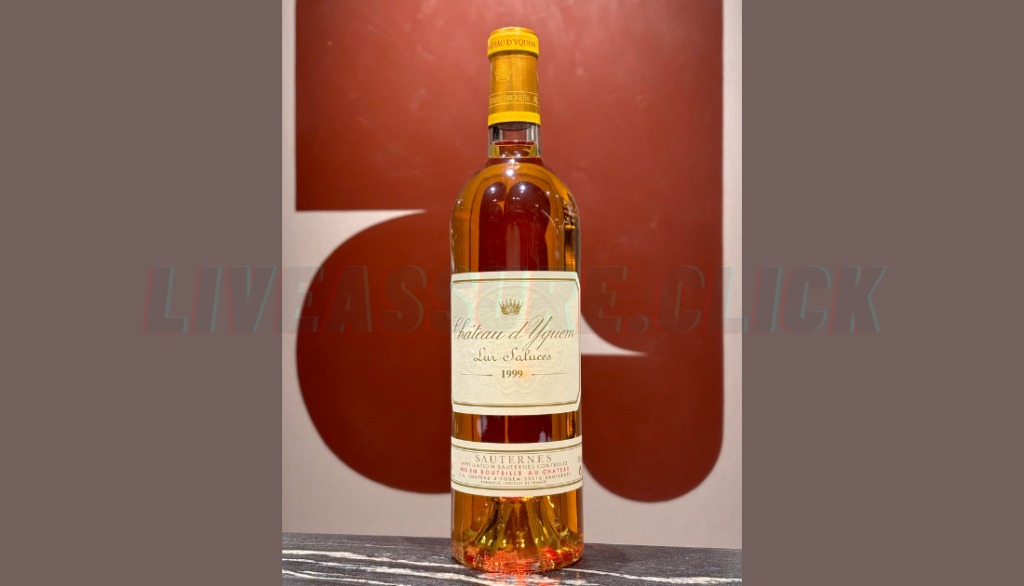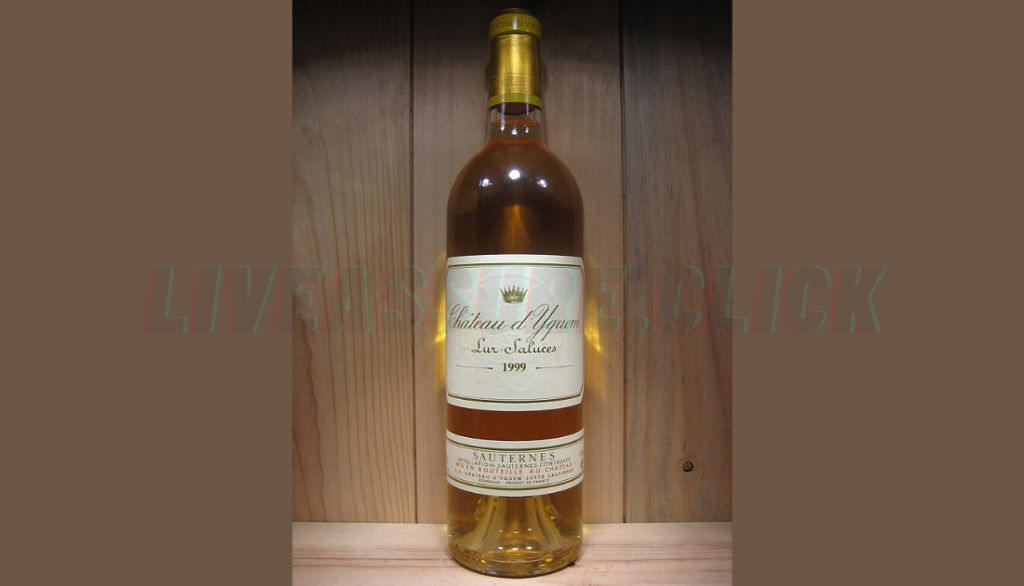
When it comes to luxury wines, Château d’Yquem is a name that consistently stands out. Known for producing the world’s finest sweet wines, this esteemed estate in the Sauternes region of Bordeaux has earned a reputation for its remarkable ability to craft wines of extraordinary complexity, depth, and longevity. Among the many exceptional vintages produced by Château d’Yquem, the 1999 vintage is particularly noteworthy, offering a perfect balance of richness and freshness, making it a highly sought-after wine for collectors and connoisseurs alike.
In this article, we will explore what makes Château d’Yquem 1999 so special, examine the factors that contributed to the success of this vintage, and highlight its tasting profile and aging potential.
A Glimpse into Château d’Yquem’s Legacy
To fully appreciate the brilliance of Château d’Yquem 1999, it’s important to understand the legacy of this iconic estate. The history of Château d’Yquem dates back to the 16th century, but it was in the 19th century that the estate truly solidified its place in the pantheon of great Bordeaux wines. The estate is located in the Sauternes region, renowned for its production of sweet wines made from Semillon and Sauvignon Blanc grapes. What sets Château d’Yquem apart is its commitment to creating wines that are not only sweet but also complex, balanced, and capable of aging for decades.
The estate’s vineyards benefit from the unique microclimate of the Sauternes region, which is influenced by the nearby Garonne River and the mist that forms in the autumn. This mist helps foster the growth of Botrytis cinerea (also known as noble rot), which is a key factor in the production of Sauternes wines. The rot concentrates the sugars and flavors in the grapes, resulting in a wine that is both sweet and flavorful, with remarkable depth.
The 1999 Vintage: A Year of Balance and Elegance
The Château d’Yquem 1999 is often regarded as one of the standout vintages of the late 1990s. The growing season for this vintage was marked by favorable conditions that allowed the grapes to ripen evenly, while also maintaining a good level of acidity. While Sauternes is often subject to the whims of the weather, 1999 was a year that brought a harmonious balance between sugar concentration, freshness, and complexity.
One of the key factors in the success of Château d’Yquem 1999 was the development of noble rot. The combination of humid mornings and sunny afternoons in the late harvest season allowed the Semillon and Sauvignon Blanc grapes to be infected by Botrytis cinerea, which resulted in the concentration of sugars and the development of rich, complex flavors.
Additionally, the relatively dry conditions during the late summer allowed the remaining healthy grapes to mature without being affected by excessive rain. As a result, Château d’Yquem 1999 has a remarkable balance of richness, sweetness, and acidity, which is one of the hallmarks of a great Sauternes wine.
Tasting Notes: A Luxurious Experience in Every Sip
Château d’Yquem 1999 is a wine that captivates the senses from the moment the bottle is opened. As one of the finest sweet wines in the world, it is a true testament to the estate’s exceptional craftsmanship. The tasting profile of Château d’Yquem 1999 is a harmonious blend of intense sweetness, rich fruit flavors, and nuanced complexity.
- Nose
On the nose, Château d’Yquem 1999 is an aromatic bouquet of honey, candied orange peel, and ripe tropical fruits, such as pineapple and mango. There are also hints of apricot jam, dried fruit, and a touch of vanilla bean. As the wine breathes, subtle floral notes of honeysuckle and jasmine emerge, adding an extra layer of depth to the wine’s aromatic profile. The influence of noble rot is apparent in the complex mix of honeyed sweetness and earthy undertones. - Palate
The palate of Château d’Yquem 1999 is rich, luscious, and full-bodied, with a perfect balance of sweetness and acidity. The wine coats the mouth with flavors of ripe peaches, caramelized sugar, and candied citrus fruits, while the Semillon grape contributes a creamy texture that adds to the wine’s luxurious mouthfeel. The acidity is vibrant and refreshing, providing a counterpoint to the wine’s sweetness and preventing it from feeling overly cloying. The finish is long, with notes of toasted almonds, honey, and a subtle hint of spice, leaving a lasting impression on the palate. - Finish
The finish of Château d’Yquem 1999 is exceptionally long and smooth, with the sweetness gradually giving way to more savory and nuanced flavors. There is a lingering note of apricot and orange zest, as well as a delicate, almost mineral undertone that provides a sense of freshness. This balance between sweetness and freshness is what makes this wine so remarkable and sets it apart from other sweet wines.

Aging Potential: A Wine That Evolves with Time
One of the most remarkable aspects of Château d’Yquem 1999 is its aging potential. Like many of the estate’s wines, this vintage has the structure and acidity necessary to age for several decades, developing even more complexity and nuance as it matures. As the wine ages, the sweet fruit flavors will become more concentrated, and the wine will develop additional layers of honey, nuts, and spices. Over time, the wine will evolve into a more savory, nuanced wine with rich tertiary flavors that make it a true collectible.
While Château d’Yquem 1999 can be enjoyed now, those who have the patience to cellar this wine for another 10, 20, or even 30 years will be rewarded with a truly extraordinary experience. The wine’s potential for further development makes it a prized possession for collectors and investors alike.
Why Choose Château d’Yquem 1999?
There are several reasons why Château d’Yquem 1999 stands out as a top-tier wine in the world of fine Bordeaux wines:
- World-Class Quality
As one of the most respected producers of sweet wines, Château d’Yquem consistently delivers exceptional wines that set the standard for Sauternes. The 1999 vintage is no exception, showcasing the estate’s ability to create a wine that is both rich and elegant, with remarkable complexity. - Richness and Elegance
Château d’Yquem 1999 strikes a perfect balance between sweetness and acidity, offering a luxurious mouthfeel while maintaining freshness. This balance is the hallmark of a great Sauternes and is what makes this wine so highly regarded by collectors and wine lovers. - Aging Potential
With its excellent structure and acidity, Château d’Yquem 1999 is a wine that can age gracefully for decades. For those who enjoy wines that evolve and improve over time, this vintage represents a long-term investment in a wine that will continue to offer new layers of complexity as it matures. - Prestige
Owning a bottle of Château d’Yquem is a symbol of refined taste and sophistication. As one of the most prestigious estates in Bordeaux, Château d’Yquem is highly sought after, making its wines a prized addition to any collection. - Pairing with Food
While Château d’Yquem 1999 is an excellent wine to enjoy on its own, it also pairs beautifully with a range of foods. It is an ideal companion for rich desserts such as crème brûlée, foie gras, or a selection of fine blue cheeses. The wine’s sweetness and acidity complement the richness of these dishes, making it an exceptional choice for special occasions and celebrations.
Conclusion: A Timeless Treasure
Château d’Yquem 1999 is a wine that embodies the essence of luxury, craftsmanship, and timeless elegance. Its exceptional balance of sweetness, richness, and acidity makes it one of the finest sweet wines produced in Bordeaux. Whether enjoyed in its youth or cellared for further aging, this wine promises to offer a remarkable tasting experience for years to come.
For collectors and connoisseurs seeking a wine that not only delights the senses but also has the potential to evolve and improve over time, Château d’Yquem 1999 is an essential addition to any cellar. With its unparalleled complexity and remarkable aging potential, this vintage is a true testament to the art of winemaking and a perfect expression of the legacy of Château d’Yquem.



